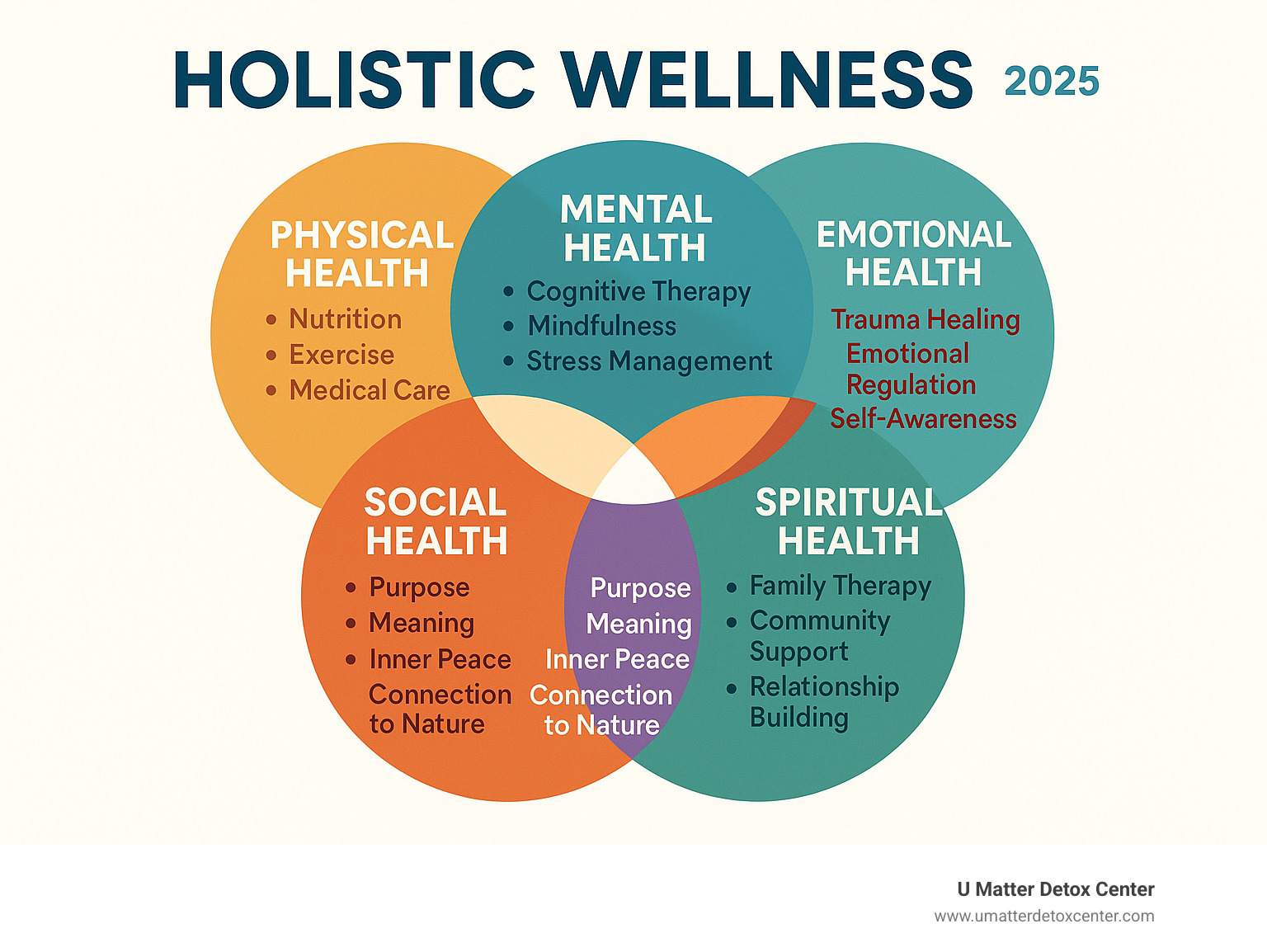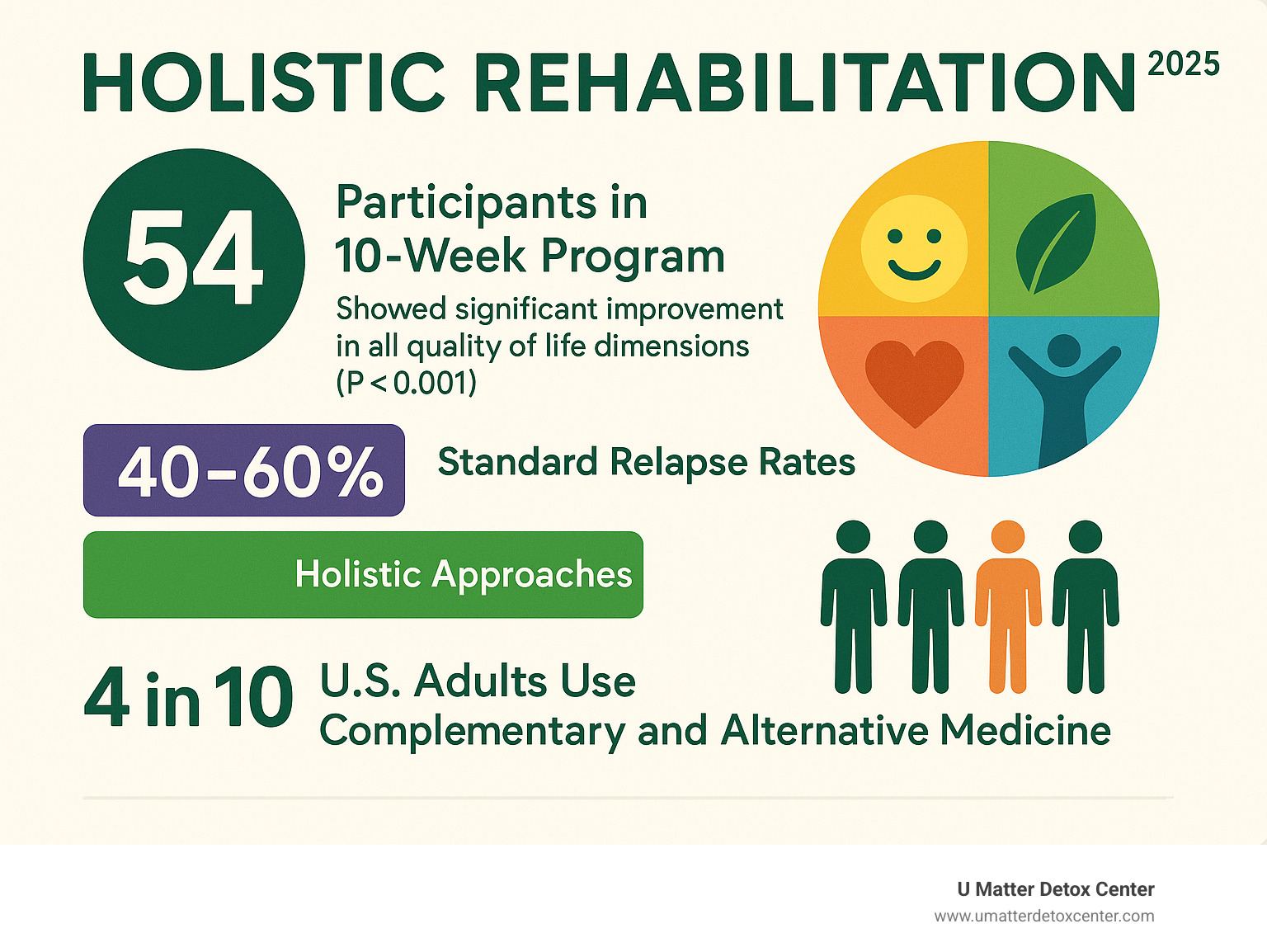What is Holistic Rehabilitation?
Holistic rehabilitation is a comprehensive treatment approach that addresses the whole person—mind, body, and spirit—rather than just treating addiction symptoms. This integrative method recognizes that lasting recovery requires healing all interconnected aspects of an individual's well-being.
Key aspects of holistic rehabilitation:
- Whole-person focus: Treats physical, mental, emotional, and spiritual dimensions simultaneously
- Root cause treatment: Addresses underlying issues like trauma, stress, and emotional imbalances
- Individualized care: Tailors treatment plans to each person's unique needs and circumstances
- Complementary therapies: Integrates traditional medical treatment with alternative modalities like yoga, meditation, and acupuncture
- Long-term wellness: Emphasizes sustainable recovery and personal growth beyond symptom management
The growing popularity of holistic approaches reflects a shift in how we understand addiction recovery. About 4 out of 10 adults in the United States use some form of complementary and alternative medicine (CAM), according to research. This trend extends to addiction treatment, where holistic methods are increasingly recognized for their ability to improve treatment engagement and long-term outcomes.
Unlike traditional rehab that primarily focuses on detox and behavioral change, holistic rehabilitation views addiction as a symptom of deeper imbalances. As one case study noted, following traumatic brain injury, "individuals often face a painful loss of pre-injury personhood and struggle to reconcile with their post-injury self"—a challenge that holistic approaches are uniquely equipped to address through comprehensive, multi-dimensional healing.
Research supports this comprehensive approach. A study of 54 participants in a 10-week holistic rehabilitation program found significant improvements across all quality-of-life dimensions (physical, psychological, environmental, and social) with statistical significance (P < 0.001).

The Core Principles and Modalities of Holistic Healing
Holistic rehabilitation rests on four core ideas:
- Interconnectedness – body, mind, emotions and spirit constantly influence one another.
- Balance – cultivating steadiness rather than chasing perfection.
- Individualized care – every plan is custom-built around your history and goals.
- Empowerment – you are an active partner, not a passive patient.
Explore more creative options in Breaking Free with Alternative Addiction Therapies You Didn't Know Existed.

The Physical Dimension
Addiction depletes nutrition, sleep and immunity. A few evidence-backed ways we restore the body include:
- Nutritional therapy – lab testing and targeted meal plans correct common vitamin and mineral gaps.
- Exercise & yoga – movement releases endorphins, rebuilds strength and improves mood.
- Acupuncture & massage – research shows both can ease withdrawal discomfort and lower stress.
- Supplemental technologies – non-invasive devices backed by cardiac-rehabilitation data.
The Mental & Emotional Dimensions
Many people use substances to mute anxiety, depression or trauma. We combine traditional talk therapy with mind-body tools so you learn new coping skills:
- Mindfulness & meditation – strengthen attention and reduce reactivity.
- Cognitive Behavioral Therapy (CBT) – reframe unhelpful thought loops.
- Creative therapies (art, music) – process feelings words can’t reach.
- Equine or nature work – experiential activities that build trust and self-regulation.
Trauma-informed care is central; see how identity shifts after injury in The Impact of Traumatic Brain Injury on Self-Identity and our primer Zen and the Art of Mental Maintenance: Holistic Retreats Explained.
The Spiritual & Social Dimensions
Spiritual care in a non-religious sense is about purpose, values and connection:
- Spiritual counseling & reflection – clarify what makes life meaningful to you.
- Nature therapy – time outdoors reliably lowers cortisol.
- Group & family work – rebuild support networks and healthy communication.
Studies link spiritual practice and social support to higher recovery rates and self-efficacy. Together these dimensions create the “whole-person” foundation that sets holistic rehab apart.
Holistic vs. Traditional Treatment: A Comparative Look
Traditional rehab focuses on detox and symptom control. Holistic rehab zooms out to treat the entire person. The goal isn’t only abstinence; it’s long-term wellness.
| Aspect | Holistic Rehabilitation | Traditional Rehabilitation |
|---|---|---|
| Focus | Mind-body-spirit | Primarily medical/behavioral |
| Goal | Sustainable well-being | Stopping use |
| Therapies | Medical plus complementary | Evidence-based medical |
| Patient Role | Active collaborator | Recipient |
| Relapse View | Learning opportunity | Restart treatment |
The two approaches are not mutually exclusive. The most effective programs blend medical detox, psychiatric care and evidence-based therapy with yoga, nutrition, and other adjuncts. This integration improves retention, satisfaction and overall quality of life—find details in What to Expect at a Holistic Detox Center: Therapies, Benefits, and Results.

The Evidence in Brief
A 10-week study of 54 participants found significant quality-of-life gains across physical, psychological, social and environmental domains (P < 0.001). Complementary modalities also:
- Boost treatment retention and satisfaction.
- Teach portable stress-management skills.
Research remains young, but the trend is clear: holistic add-ons make proven medical care even more effective. See practical options in Alternative Detox Methods That Actually Make Sense.
The Transformative Benefits of a Holistic Approach
When you choose holistic rehabilitation, you're not just treating addiction—you're starting on a journey of complete personal change. This comprehensive approach creates lasting changes that ripple through every aspect of your life, building a foundation for recovery that goes far beyond simply staying sober.
Long-term Well-being and Reduced Relapse Rates:
Let's be honest about the statistics: traditional addiction treatment faces some tough challenges. The National Institute on Drug Abuse reports that relapse occurs in 40-60% of cases post-treatment—rates that are similar to other chronic diseases like diabetes or hypertension. But here's where holistic approaches show real promise.
The difference isn't magic—it's methodology. While traditional treatment often focuses on removing substances from your life, holistic rehabilitation teaches you how to build a life you actually want to live. When you have genuine reasons to stay healthy, sustainable recovery becomes much more achievable.
Improved Self-awareness and Coping Skills:
One of the most powerful gifts of holistic treatment is the development of deep self-awareness. Through practices like mindfulness meditation, art therapy, and reflective journaling, you learn to recognize your triggers and warning signs before they become overwhelming. You start understanding your emotional patterns and responses in ways that feel empowering rather than overwhelming.
This self-awareness becomes your personal early warning system. Research shows that "mindfulness and meditation can increase awareness of addiction triggers," helping you respond more skillfully when life gets challenging. Instead of relying solely on willpower, you develop a toolkit of healthy coping mechanisms that actually work.
Restoration of Natural Wholeness:
Holistic rehabilitation works to restore what researchers call "a natural state of wholeness"—that balanced feeling where your physical, mental, emotional, and spiritual aspects work together harmoniously. This restoration process involves healing your body through proper nutrition and natural therapies, addressing emotional wounds and trauma with compassion, and cultivating spiritual connection and purpose.
When all these pieces come together, you experience something remarkable: you start feeling like yourself again, often for the first time in years.
Personal Growth and Empowerment:
Perhaps most importantly, holistic approaches foster genuine personal growth. Rather than just teaching you to avoid substances, these methods help you find your personal values and meaning, develop authentic relationships, and build confidence in your ability to handle whatever life throws your way.
This isn't about becoming a different person—it's about becoming the best version of who you already are. You learn to create sustainable lifestyle changes that support your well-being naturally, without constant struggle or deprivation.
The change goes beyond recovery into true personal empowerment. You develop the skills and confidence to not just maintain sobriety, but to thrive in all areas of your life.
For those interested in exploring natural approaches to recovery and personal growth, we've detailed various options in Natural Highs: Exploring Alternative Addiction Recovery Options.

Crafting Your Path: Personalization in Holistic Recovery
The beauty of holistic rehabilitation lies in recognizing that no two recovery journeys are identical. Just as every person has unique fingerprints, each individual brings their own combination of experiences, challenges, and strengths to the recovery process. This understanding forms the foundation of truly personalized treatment.
The Journey Begins with Understanding You
Your path to healing starts with a comprehensive intake assessment that goes far beyond simply asking about substance use. Think of it as creating a detailed map of your life—one that explores your physical health, mental well-being, relationships, spiritual beliefs, and personal goals. This isn't just paperwork; it's the foundation for crafting a treatment plan that actually fits your life.
During this assessment, treatment teams examine your medical history and current physical health, explore any mental health conditions you may be experiencing, and understand your substance use patterns. They also dig into important areas like trauma history, social support systems, and even your cultural background and spiritual practices. This holistic view ensures that nothing important gets overlooked.
When Two Challenges Become One Solution
Many people entering recovery find they're dealing with more than just addiction. Conditions like depression, anxiety, or trauma often walk hand-in-hand with substance use disorders. This is where dual diagnosis treatment becomes crucial—addressing both conditions simultaneously rather than treating them separately.
Personalized dual diagnosis care might include integrated treatment planning that addresses both your addiction and mental health needs, specialized therapies for trauma or anxiety, and coordinated care between different specialists. The goal is creating a seamless treatment experience where all aspects of your health work together toward recovery.
Your Treatment, Your Way
Once your assessment is complete, the real collaboration begins. Treatment teams work with you to select therapies that resonate with your personality, preferences, and goals. Maybe you find peace in yoga and meditation, or perhaps you connect better with art or music therapy. Some people thrive with outdoor activities and nature therapy, while others prefer group discussions and peer support.
The beauty of this approach is that it honors what makes you unique. Your cultural background, spiritual beliefs, and personal interests all become part of your healing journey. This isn't about forcing you into a predetermined mold—it's about creating space for you to heal in ways that feel authentic and sustainable.
Growing and Adapting Along the Way
Recovery isn't a straight line, and neither is your treatment plan. As you grow and change throughout your journey, your plan evolves with you. Maybe you find a new interest in mindfulness practices, or perhaps you need additional support for trauma healing. Your treatment team regularly reassesses your progress and adjusts your plan accordingly.
This flexibility ensures that your treatment remains relevant and effective throughout your recovery journey. As one program beautifully put it, "the plan is tweaked during your stay for reasons like unexpected lack of progress, changed growth trajectory, or new skills/interests emerging that can be integrated into treatment."
For those navigating the complexities of both mental health and addiction recovery, we've explored this topic in depth in Mind Meets Matter: Navigating Dual Diagnosis Rehab Programs.
The result of this personalized approach is treatment that doesn't just address your addiction—it helps you build a life you're genuinely excited to live. Because at the end of the day, that's what sustainable recovery is all about: creating a life so fulfilling that substances simply don't fit anymore.
Frequently Asked Questions about Holistic Rehabilitation
How is a holistic treatment plan created?
It starts with a comprehensive intake assessment covering medical history, mental health, substance use patterns, social supports, culture and spiritual beliefs. You and the team then set goals and choose modalities that fit. Progress is reviewed often, and the plan adjusts as you grow.
Do holistic therapies replace medical treatment?
No. Medical detox, psychiatric care and evidence-based counseling remain the backbone. Holistic therapies simply add extra layers of support—stress relief, body repair, purpose—making the core treatment easier to stick with and more fulfilling.
What if I’m not religious?
Spiritual care here means purpose and connection, not dogma. Practices might include mindfulness, nature walks, service or value exploration—whatever helps you feel part of something larger.

Conclusion: Embracing Whole-Person Healing for a New Beginning
Holistic rehabilitation isn't just another treatment option—it's a complete reimagining of what recovery can look like. Instead of simply focusing on stopping substance use, this approach recognizes that true healing happens when we address every part of who you are as a person.
Think about it this way: addiction touches every corner of your life. It affects your body, your mind, your relationships, and your sense of purpose. So doesn't it make sense that recovery should address all these areas too?
The research backs this up beautifully. When 54 people participated in a 10-week holistic program, they didn't just get clean—they experienced significant improvements across all quality-of-life dimensions. Their physical health improved. Their mental wellbeing flourished. Their relationships got stronger. Their environment became more supportive. That's the kind of comprehensive change that creates lasting recovery.
What makes holistic rehabilitation truly special is how it empowers you to become the author of your own healing story. You're not just receiving treatment—you're learning skills, finding strengths you didn't know you had, and building a life that feels genuinely worth living.
The change happens on multiple levels. Your body heals from the physical damage of addiction through proper nutrition, exercise, and natural therapies. Your mind finds peace through meditation, counseling, and stress management techniques. Your heart heals from old wounds through trauma therapy and emotional support. Your spirit reconnects with purpose and meaning through spiritual exploration and community connection.
This isn't about perfection—it's about progress. It's about finding that recovery can be a journey of growth rather than just a struggle against addiction. When you address the root causes that led to substance use in the first place, you're not just preventing relapse—you're creating a foundation for a life that's richer and more fulfilling than you might have imagined possible.
At U Matter Detox Center, we've seen how powerful this whole-person approach can be. Our luxury holistic programs combine the latest evidence-based treatments with time-tested natural remedies, creating an environment where deep healing can happen. Whether you're in Beverly Hills, Malibu, or Hollywood Hills, we're committed to honoring your unique journey and supporting you every step of the way.
The beautiful thing about holistic rehabilitation is that it doesn't just help you recover from addiction—it helps you recover yourself. The person you were meant to be before addiction took hold. The person who has dreams, relationships, and a sense of purpose that goes far beyond just staying sober.
If you're ready to accept this kind of comprehensive healing, we're here to help. Recovery is possible, change is real, and your life matters more than you know. Explore our holistic detox programs to start your journey to wellness and find what whole-person healing can mean for you.
Your new beginning starts with a single decision—the decision that you're worth fighting for. And once you make that choice, you'll never have to face the journey alone.

